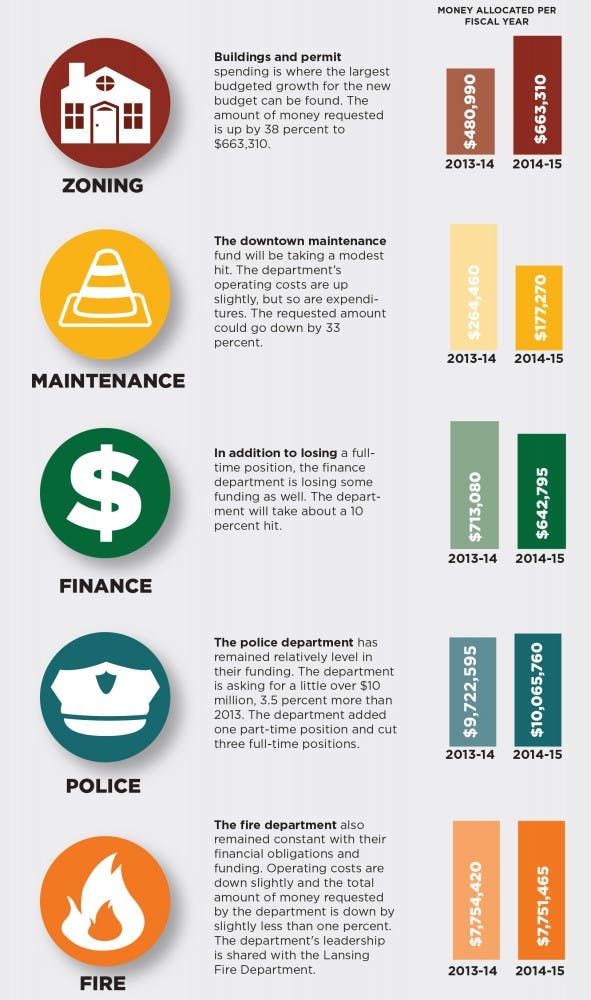Multiple members of East Lansing City Council have used one word to describe the financial strategy of the city following the economic recession this past decade: patience.
This year, it might finally be starting to pay off.
Council members have begun the process of looking through the preliminary version of the budget for fiscal year 2015. They will begin discussing line-by-line budget specifics Tuesday night during a special session in City Hall starting at 5 p.m.
Council has until May 20 to ratify or change the current version.
The general fund for the city sits at just a little more than $32 Million, making it the third straight year the city has maintained consistent budgeting. The proposed total fund is less than one percentage point lower than last year’s actual budget.
After years of admittedly conservative economic policies and a budget that sees increases in the city’s two biggest forms of revenue, City Manager George Lahanas is cautiously optimistic about the city’s future.
“Of the last three years, this is the budget we feel most optimistic about,” Lahanas said. “We’ve managed our way through tough financial times.”
Lahanas cautioned the increase in money from the state and increased property tax revenue still means the city has to watch how they spend their money.
“(The increases) are small upticks after years of declines,” he said. “By no means are we out of financial challenges.”
Help from down the road
In recent years, less money has trickled down to Michigan cities through shared revenue from the state, which has put additional strain on communities like East Lansing.
Since 2001, revenue sharing has been cut in Michigan by $6.2 billion, resulting in a cumulative loss of $20 million for East Lansing in that time, East Lansing Mayor Nathan Triplett said. By comparison, the general fund budget proposed for the city in fiscal year 2015 is a little more than $32 million.
“It’s like almost an entire year of revenue evaporated,” Triplett said.
Lahanas said the city is budgeting for an increase of about 3 percent in the preliminary version of the budget, but after the state’s budget went through the state House of Representatives, it looks like that increase might be too much to budget for.
“The state is forecasting the pot of money used for revenue sharing to be bigger this year,” he said. “The House has come out with something that is less favorable to cities.”
Taxes, taxes, taxes
If revenue sharing is the second largest source of income for the city, the largest is property tax revenue.
“Property tax revenue is going up a little bit, which is the pillar of our finance system,” East Lansing Councilmember Ruth Beier said. “I still worry there is not enough property tax revenue.”
Beier pointed to new developments that receive certain tax protections that keep them from paying property tax for the first 30 years they exist.
“We don’t have enough property tax revenue because we gave it all away,” she said. “We’re not doing the things we need to do now like repairing the roads.”
Repairing roads and other infrastructure issues are high on the list of priorities for council and Lahanas moving forward. However, the downtown maintenance department could be taking a 33 percent hit from last year going into 2015, according to the current budget.
Lahanas and Triplett said they still expect to be able to work on infrastructure projects, such as improving roads and sidewalks, in the coming years.
“Because things are stabilized, the most notable thing is we’ve managed to be able to propose significant increases to infrastructure projects,” Triplett said. “Our caution during difficult times has put us on strong financial footing.”
“We’ve managed ourselves through tough financial times,” Lahanas said. “We can now spend more time on infrastructure projects.”
Although she doesn’t think the city is generating enough property tax revenue, Bier said she would not recommend many changes to the current budget plan because the problems don’t lie with the budget, but rather with a lack of tax revenue from new development projects.
“The budget given our current revenue restraints is not bad,” she said. “I won’t be suggesting many changes to it.”
Department by department
Like the overall budget from fiscal year 2013 to fiscal year 2014, departments within the city saw little in the way of changes to their funding. East Lansing police cut three full-time positions and added one part-time position. They asked for a little more than $10 million, which is up 3.5 percent from last year.
The East Lansing Fire Department has remained mostly stable. The department has 51 full-time employees, which is the same as last year. The total amount of the general fund preliminarily budgeted to the department is down by less than a percentage point.
One of the biggest changes in funding is found in the housing inspection section of the Department of Planning, Building and Development. Their budgeted amount is up 38 percent. Although the section is small and generates under $700,000, the change was one of the highest proposed by any department.
Although operating costs are up, the department is bringing in more money through increased building activity that need to be inspected, Director of Planning, Building and Development Tim Dempsey said.
“The improved economy allows for people to put more money into their homes,” he said.
Increases in the amount of housing projects in the city have also been to linked to increases in revenue.
Overall, city officials were happy with the way the preliminary budget turned out, and some are happy with the direction the city is going in the future.
“What you have seen over the years is a very cautious approach to budgeting,” Triplett said.
Beier however, said the amount property taxes are increasing is not conducive with the rate that city costs are going up.
“Growth is slow and costs are going up faster,” she said.







